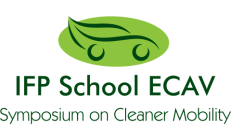Presentation
ECAV stands for Electric, Connected and Autonomous Vehicle for smart mobility.
Launched beginning 2019, this chair is supported by the Fondation Tuck, one of the School's historic partners.
The two holders of the chair are Dr Ouafae El Ganaoui-Mourlan (IFP School) and Dr Antonio Sciarretta (IFP Energies nouvelles).
Context
In the future, the Electric, Connected and Autonomous Vehicle (ECAV) will be a means to meet not only the requirements for individual comfort, safety and fluidity of transport, but also environmental issues (local pollution and global pollution – GHG emissions / CO2). Therefore, there will be significant needs in the future for in-depth scientific knowledge and new skills in the field of ECAV.
These future needs were confirmed by a strategic study carried out at IFP School at the end of 2017 - beginning of 2018 by the Powertrains and Sustainable Mobility Center with a strong commitment of our industrial partners. Among the main orientations toward electro mobility, new lectures related to ECAV have to be created and integrated in the Powertrain Engineering International program. The goal is to develop students’ skills and prepare them to the future needs of the industry.
This Chair also has a prominent role in the development of closer relations between teaching and research activities in this field. For instance, via PhD policy and the R&I strategy of IFPEN.
Objectives
The ECAV Chair operates in two fields, Education and Research.
- Education
The purpose of the Chair is to support the evolution of IFP School's Powertrains and Sustainable Mobility programs towards the electric, connected and autonomous vehicle. Hence, a new teaching unit has been introduced in the Powertrain Engineering program, specifically dedicated to ECAV. It includes lectures such as connected and automated vehicle control, introduction to lateral vehicle dynamic, communications and networks for connected vehicles, machine learning algorithms and neural network etc.
- Research
PhD and postdoc topics have already been approved as part of the Chair. Some internships are also being supervised. Our first PhD focuses on Cooperating vehicles with centralized optimizer. Cooperative control has been studied for several specific scenarios. On the ground of IFPEN’s past research on eco-driving, we aim at generalizing these scenarios to a urbain / extra-urbain comprehensive framework, with a certain number of cooperating vehicles.
Moreover, dissemination of our achievements is an essential part of our work.
Thus, the Chair will sponsor the presentation of the students’ most promising work at conferences (SIA, SAE, etc.).
The Chair will also support the organization of a remote conference on November 24th, 2020 due to Covid-19 restrictions.
Our events

November 24th, 2020
9.00 am to 5.00 pm (Paris time)
Organized via Zoom
"Unleashing the potential of connected and autonomous public transportation for a cleaner mobility"
The symposium tackled the "Energy and Environmental Impact of Automated Public Transport". It aimed to:
- identify gaps and barriers which will be documented by the Chair;
- develop skills for the future and
- identify technological boundaries to be overcome.
View the detailed program
About the speakers: biographies and abstracts
>> Access the presentations:
>> Check out the virtual room to discover the students' posters
About the Scientific Committee
___________________________
Contacts:
Dr Ouafae El Ganaoui-Mourlan
Dr Antonio Sciarretta